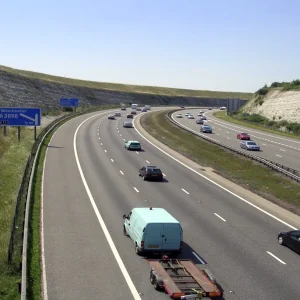
The van and light commercial vehicle (LCV) market in the UK is a vital segment of the broader automotive industry, playing a crucial role in the logistics, transportation, and service sectors. However, the economic downturn has significantly affected this market, leading to shifts in demand, production challenges, and changes in consumer behaviour. This article delves into the multifaceted impact of the economic downturn on the UK van and LCV market, providing insights into the key trends, challenges, and potential opportunities for businesses operating in this sector.
Overview of the UK Van and LCV Market
Market Size and Segmentation
The UK van and LCV market is a substantial part of the country’s automotive industry. According to the Society of Motor Manufacturers and Traders (SMMT), LCVs account for around 10-12% of all vehicle registrations annually. The market is segmented into various categories based on vehicle size, payload capacity, and use cases, ranging from small city vans to large panel vans and specialised vehicles.
Importance to the Economy
LCVs are essential for a wide range of businesses, including delivery services, tradespeople, construction companies, and public sector organisations. They enable efficient transportation of goods and services, contributing to the UK’s economic productivity and growth. The market’s health is thus closely linked to the broader economic conditions.
Economic Downturn: Causes and General Impact
Global and Domestic Factors
The recent economic downturn can be attributed to a combination of global and domestic factors. The COVID-19 pandemic had a profound impact, leading to lockdowns, reduced consumer spending, and disrupted supply chains. Additionally, Brexit introduced uncertainties and new trade barriers, affecting imports and exports. More recently, inflationary pressures and rising interest rates have compounded these challenges, leading to decreased business and consumer confidence.
Impact on Business Investment
Economic downturns typically lead to reduced business investment, as companies become more cautious with their capital expenditures. For the van and LCV market, this means fewer purchases of new vehicles, delayed fleet renewals, and increased focus on maintaining existing vehicles. Businesses may opt to extend the lifecycle of their current fleets rather than invest in new models, impacting sales and production.
Shifts in Demand and Consumer Behaviour
Decline in New Vehicle Sales
One of the most immediate impacts of the economic downturn on the van and LCV market is the decline in new vehicle sales. Data from the SMMT indicates that new LCV registrations have seen significant drops during periods of economic contraction. For instance, in 2020, new LCV registrations fell by nearly 20% compared to the previous year.
Increase in Used Vehicle Market
Conversely, the used vehicle market often sees increased activity during economic downturns. Businesses looking to manage costs may opt for used vans and LCVs, which are more affordable than new models. This shift can lead to higher demand for second-hand vehicles, driving up prices in the used vehicle market.
Production and Supply Chain Challenges
Disrupted Supply Chains
The global supply chain disruptions caused by the pandemic have had lingering effects on the van and LCV market. Shortages of key components, such as semiconductors, have slowed production, leading to longer lead times and delayed deliveries. Manufacturers have struggled to meet demand, exacerbating the decline in new vehicle availability.
Impact on UK Manufacturing
The UK’s own automotive manufacturing sector has been impacted by these supply chain issues, along with the additional complications of Brexit. The introduction of new customs checks and tariffs has increased costs and complexity for manufacturers relying on cross-border trade. As a result, some UK-based manufacturers have reduced production volumes or even relocated operations to other countries.
Changes in Financing and Leasing
Tightening Credit Conditions
Economic downturns typically lead to tighter credit conditions, as lenders become more risk-averse. This can make it harder for businesses to finance the purchase or leasing of new vans and LCVs. Higher interest rates also mean that financing costs are higher, which can further deter investment in new vehicles.
Leasing Trends
Leasing has become an increasingly popular option for businesses looking to manage costs and maintain flexibility. During an economic downturn, leasing can offer a more manageable financial commitment compared to purchasing vehicles outright. However, the leasing market is not immune to the challenges of tighter credit conditions, which can affect the terms and availability of lease agreements.
Technological and Regulatory Developments
Shift Towards Electric Vehicles (EVs)
Despite the economic downturn, the push towards greener, more sustainable transportation continues. The UK government has set ambitious targets for reducing carbon emissions, including a ban on the sale of new petrol and diesel vehicles by 2030. This has spurred interest in electric vans and LCVs, although their higher upfront costs and limited availability remain barriers.
Regulatory Pressures
Regulations aimed at reducing emissions and improving air quality, such as the Ultra Low Emission Zones (ULEZ) in London and other cities, are driving businesses to consider cleaner vehicle options. Compliance with these regulations can be costly, especially during economic downturns, but they also create opportunities for manufacturers of low-emission and electric LCVs.
Opportunities and Strategies for Businesses
Embracing Technological Innovations
Businesses in the van and LCV market can leverage technological innovations to mitigate the impact of the economic downturn. Telematics, for instance, can optimise fleet management by improving route planning, reducing fuel consumption, and enhancing vehicle maintenance. Investing in such technologies can lead to cost savings and increased operational efficiency.
Diversifying Revenue Streams
Diversification can help businesses weather economic downturns. For manufacturers and dealers, expanding into related services, such as vehicle maintenance, repair, and leasing, can provide additional revenue streams. Similarly, businesses using vans and LCVs can explore new markets or services that may be in demand during economic downturns, such as home delivery or mobile services.
Government Support and Incentives
Government support and incentives can play a crucial role in mitigating the impact of the economic downturn. The UK government has introduced various schemes to support businesses, such as grants and subsidies for purchasing electric vehicles, and financing options for small and medium-sized enterprises (SMEs). Businesses should stay informed about these opportunities and take advantage of available support.
Case Studies and Industry Examples
Amazon and the Rise of E-Commerce
The growth of e-commerce, accelerated by the pandemic, has increased demand for delivery services and, consequently, for vans and LCVs. Companies like Amazon have invested heavily in expanding their delivery fleets, including electric vans, to meet the surge in online shopping. This trend highlights the potential for growth in certain segments of the van and LCV market, even during economic downturns.
Local Authorities and Public Sector Adaptations
Local authorities and public sector organisations have also adapted their fleets in response to economic pressures and regulatory requirements. Many councils are investing in electric vans to meet emission targets and reduce long-term operational costs. These adaptations can serve as models for private businesses looking to optimise their fleets.
Future Outlook
Recovery and Growth Prospects
The long-term outlook for the UK van and LCV market will depend on the broader economic recovery and the ability of businesses to adapt to new challenges. As economic conditions improve, demand for new vehicles is expected to recover. However, the pace of this recovery will be influenced by factors such as consumer confidence, government policies, and the ongoing evolution of supply chains.
Emerging Trends
Several emerging trends are likely to shape the future of the van and LCV market. The transition to electric vehicles will continue to gain momentum, driven by regulatory pressures and technological advancements. Additionally, the integration of advanced technologies, such as autonomous driving and connected vehicle systems, will further transform the market.
Conclusion
The economic downturn has had a profound impact on the UK van and light commercial vehicle market, leading to shifts in demand, production challenges, and changes in consumer behaviour. While these challenges are significant, they also present opportunities for businesses to innovate and adapt. By embracing new technologies, diversifying revenue streams, and leveraging government support, businesses in the van and LCV market can navigate the current economic landscape and position themselves for future growth. The resilience and adaptability of this sector will be crucial in ensuring its continued contribution to the UK economy.





